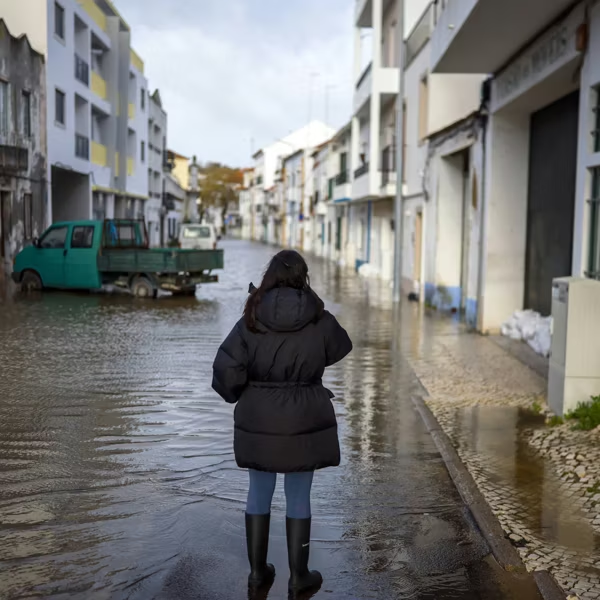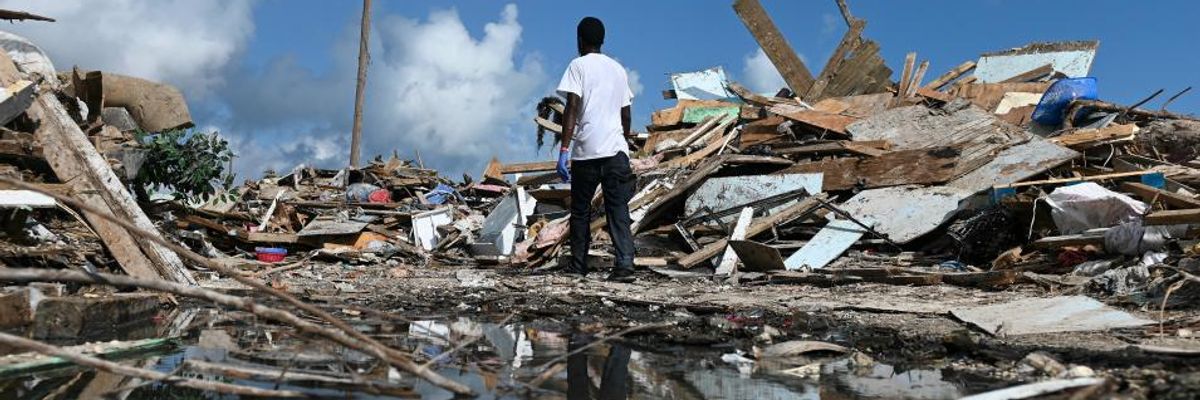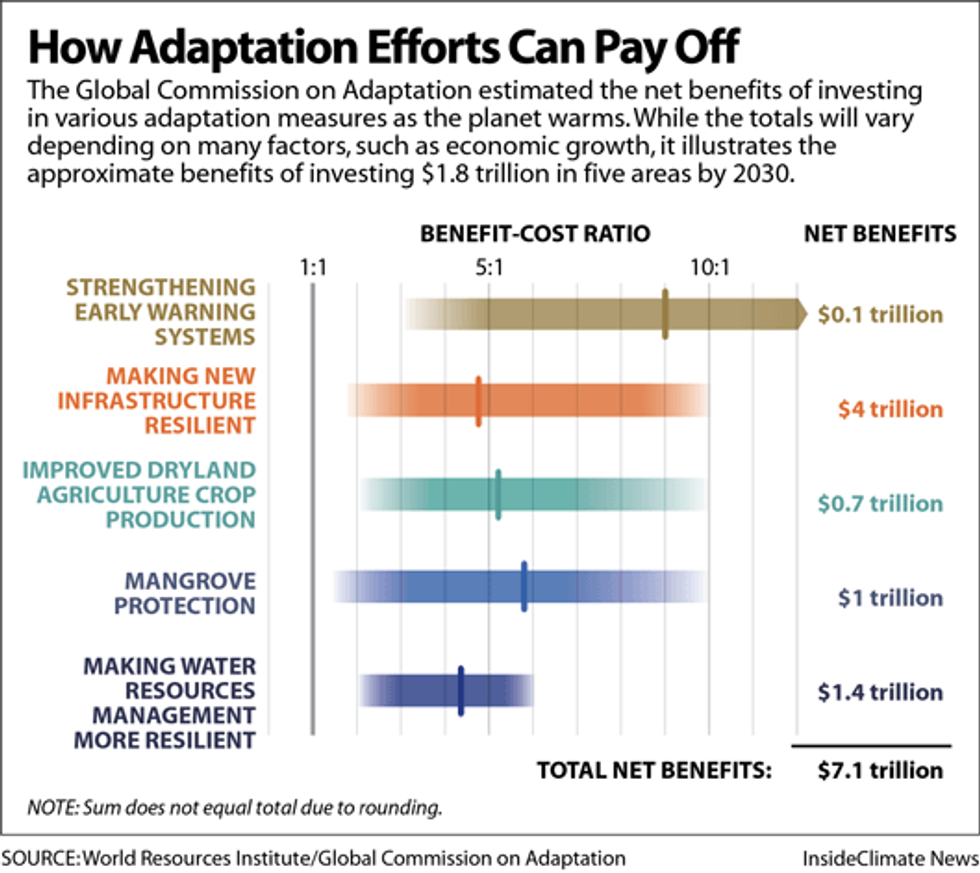Warning that the world is at risk of experiencing a "climate apartheid," a report released Tuesday by the Global Commission on Adaptation found that spending $1.8 trillion globally over a decade on adaptation could yield $7.1 trillion in net benefits.
The commission's report, Adapt Now: A Global Call for Leadership on Climate Resilience (pdf), outlines the human, environmental, and economic imperatives of investing in adaptation to the human-caused climate crisis. The report highlights the "triple dividend" of urgent, coordinated action: it would avoid future losses, generate positive economic gains, and deliver additional social and environmental benefits.
The proposed $1.7 trillion investment in climate adaptation and resulting $7.1 trillion in benefits are based on significant spending in five key areas--early warning systems, climate-resilient infrastructure, improved dryland agriculture, mangrove protection, and making water resources more resilient--between 2020 and 2030. The systemic transformations called for in the report particularly aim to address global inequalities that are increasingly exacerbated by the climate emergency.
The commission that produced the new analysis is chaired by former United Nations Secretary-General Ban Ki-moon, billionaire philanthropist Bill Gates, and World Bank CEO Kristalina Georgieva. The trio wrote in the report's foreward that, in terms of adapation, "so far the response has been gravely insufficient. Meanwhile, the climate crisis is here, now: wildfires ravage fragile habitats, city taps run dry, droughts scorch the land, and floods destroy people's homes and livelihoods."
Investing in adaptation "is a moral imperative," Patrick Verkooijen, chief executive of the Global Center on Adaptation, which co-manages the commission with the World Resources Institute, told The Washington Post.
"Even if we were to live in 1.5 degree world we would need massive adaptation," said Verkooijen, referring to the Paris climate accord goal of limiting average global temperature rise to 1.5 degrees Celsius above preindustrial levels. "Investing in adaptation is not a tradeoff with mitigation. We need to do both."
"We risk a climate apartheid where the wealthy pay to escape, while the rest of the world is left to suffer."
--Patrick Verkooijen, Global Center on Adaptation
Absent global adaptation efforts, the report estimates that by 2050, declines in agricultural yields would most seriously impact the world's 500 million small farms, the number of people lacking sufficient water could soar beyond five billion, and rising seas and devastating storms could force hundreds of millions people from their homes--costing coastal urban areas over $1 trillion per year.
Though the climate crisis is one of the greatest threats humanity faces and it impacts all sectors of society, as the report put it, "people who did the least to cause the problem--especially those living in poverty and fragile areas--are most at risk."
"We risk a climate apartheid where the wealthy pay to escape, while the rest of the world is left to suffer," Verkooijen warned. "Without bold adaptation action, climate change becomes a life sentence to poverty and suffering for already vulnerable and marginalized people."
The report comes as the Bahamas is in the beginning stages of what is expected to be a drawn out recovery process after being devastated by Hurricane Dorian, which made landfall on the islands as a Category 5 storm early this month. In what one critic decried as "eco-apartheid," hundreds of Bahamian refugees who lacked a U.S. visa were ordered off a ferry headed for Ft. Lauderdale, Florida this weekend.
The destruction in the Bahamas spotlighted climate scientists' warnings about the connection between extreme weather--including hurricanes, heatwaves, and fires--and rising temperatures from human activities that produce greenhouse gas emissions. When it comes to hurricanes, for example, experts warn that research suggests the warming world will see an increase in intense storms.
"We tend not to invest in resilience and climate adaptation efforts until after a disaster has happened, until a lot of the damage has been done," Rob Moore, a policy analyst at the Natural Resources Defense Council (NRDC), told InsideClimate News--which graphed the costs and benefits of the new report's recommendations.
Outlining major barriers to global adaptation efforts, the report says that "in addition to knowledge gaps and short-term biases, fragmented responsibilities, poor institutional cooperation, and lack of resources hinder action. Governments lack incentives and funding for agencies to grapple with knowledge gaps, collaborate across silos, and implement innovative solutions."
NRDC's Moore noted that "these types of investments are things that pay off over the long term, not over a single election cycle."
Ban, who served as the U.N. chief from January 2007 to December 2016, emphasized the importance of global collaboration on adaptation efforts in a statement Tuesday.
"Climate change doesn't respect borders: it's an international problem that can only be solved with co-operation and collaboration, across borders and worldwide," he said. "It is becoming increasingly clear that in many parts of the world, our climate has already changed, and we need to adapt with it."
"Mitigation and adaptation go hand-in-hand as two equally important building blocks of the Paris Climate Change Agreement," Ban continued. "Adaptation is not only the right thing to do, it is also the smart thing to do to boost economic growth and create a climate resilient world."
Along with events across the globe Tuesday to launch the report, contributors and supporters shared its findings and suggestions on social media with the hashtag #AdaptOurWorld.
The commission has produced a series of videos about adaptation efforts around the world--from Costa Rica and India to the Netherlands and New York City--which were shared on social media with the hashtag Tuesday:





